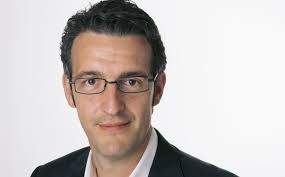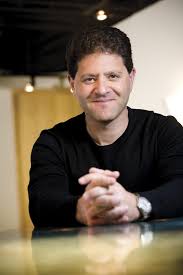 Hello, Friday! Have a great weekend, everyone. See you back here next week with some good stuff, including more with Index Ventures’ Mike Volpi (below), who shares how decisions are made at Index, whether the firm believes in price “sensitivity,” and what he makes of Bitcoin mania.
Hello, Friday! Have a great weekend, everyone. See you back here next week with some good stuff, including more with Index Ventures’ Mike Volpi (below), who shares how decisions are made at Index, whether the firm believes in price “sensitivity,” and what he makes of Bitcoin mania.
—–
Top News in the A.M.
Remember when Target let us know that up to 40 million customers’ personal information might have been stolen? Scratch that; the company now believes as many as 70 million customers were impacted by the data breach.
—–
Index Ventures’ Mike Volpi on the Pitfalls of VC Marketing
Index Ventures is widely perceived to be amid the best venture firms by other VCs. Among its active investments are Sonos, the wireless music system company; Dropbox, the popular online storage service; and Hortonworks, a commercial vendor of Apache Hadoop.
The goal for Index now is to raise its profile with U.S. entrepreneurs, many of whom still consider the firm — which launched in Geneva in 1996 and opened a London office in 2001 — to be a European venture fund.
Step one involved opening an office in San Francisco in late 2011, where general partners Danny Rimer and Mike Volpi have been sewing up deals left and right. The second part of Index’s evolution involves giving the press a (slightly) better look into its thought processes. Indeed, I sat down with Volpi at Index’s sunny offices yesterday morning, where we talked about how the historically quiet firm plans to more visibly plant its flag in the U.S. and the Bay Area in particular.
We’ve been sitting here talking about the professionalization of venture marketing. What is Index’s philosophy when it comes to selling itself?
Venture capital is changing. It’s different. And being good at marketing is an important asset today, when it just wasn’t 10 years ago.
Index certainly isn’t as ‘out there’ as some firms. Will that change?
There’s an inherent conflict that exists in doing a lot of marketing for one’s own firm, because in one dimension, being out there helps attract people to you. In theory, saying, “So and so is backed by X Venture Capital” helps the company.
But one of our key cultural tenets is that we’re supporting the entrepreneur and we want the entrepreneur to be the story, not us. So we’re not trying to take the light away from the entrepreneur. Inherently, we see a little bit of a cultural conflict. Who is in front of the parade? Is it the VC or the entrepreneur? I think if the VC firm gets too far ahead of the parade, the smart entrepreneurs might get uncomfortable with that, so we try to strike a balance.”
How exactly?
Presumably, over time, [things will take their] natural course if we do our job properly But we don’t want to put steroids on [our marketing strategy]; we don’t want to bang on every journalist’s door, saying, “Pay attention to us.”
If you’re an entrepreneur, you want your own signature on the project you’re working on and you don’t want to be overshadowed. If you don’t have a signature to speak of, then you rely on somebody else’s. It’s a gray zone for sure, but I think it’s an important line to draw.
New Fundings
Aethon, a 13-year-old, Pittsburgh, Pa.-based maker of autonomous mobile robots for hospitals and health systems, has raised $3 million from Mitsui & Co., which had invested a separate, $4 million round in Aethon in April 2012. Aethon has raised more than $20 million altogether, according to SEC filings.
Atara Biotherapeutics, a 1.5-year-old, Brisbane, Calif.-based drug development company focused on treating end-stage renal disease among others, has raised $52 million in Series B financing. Investors included Alexandria Venture Investments, Amgen Ventures, The Baupost Group, Celgene Corp., DAG Ventures, Domain Associates, EcoR1 Capital and Kleiner Perkins Caufield & Byers.
CAN Capital, a 16-year-old, New York-based, non-bank alternative capital provider to small businesses in the U.S. and Latin America, has raised $33 million in funding led by Meritech Capital Partners. Previous investor Accel Partners also participated in the round, along with new investors Ribbit Capital and QED Investors. CAN has now raised roughly $63 million to date, according to Crunchbase.
Clementia Pharmaceuticals, a three-year-old, Quebec-based company that’s developing a drug for a genetic condition called fibrodysplasia ossificans progressiva, has raised a $22.5 million in Series A financing led by OrbiMed Advisors, with participation by existing investor BDC Venture Capital.
FIRE1, a new, Dublin, Ireland-based company, has raised an undisclosed amount of Series A funding from Covidien, Lightstone Ventures, and New Enterprise Associates. FIRE1 was launched byThe Foundry, a Dublin-based medical device incubator; the company will be focusing on developing novel therapeutic devices.
Glooko, a three-year-old, Palo Alto, Calif.-based company that enables smartphone users to easily collect and view the information needed to control their blood glucose levels, has raised $7 million in Series A-1 funding from Samsung Ventures and Lifeforce Ventures. Previous investors Social + Capital Partnership and individual investors also participated. Glooko has raised $11.5 million to date, according to Crunchbase.
MN&C Supply Links Retail, a 1.5-year-old, Mumbai-based company that operates an online supermarket called LocalBanya.com, has raised an undisclosed amount in Series A funding from Karmvir Avant Group, a real estate developer in Mumbai.
Proterra, a 10-year-old, Greenville, S.C.-based maker of zero-emission-battery electric buses, has closed the second round of its Series C funding, raising more than $10 million, which brings the total round to rougly $34 million. The funding was led by new backer Tao Invest (the family firm of Nick and Joby Pritzker). Previous investorsEdison Energy, Constellation, Kleiner Perkins Caufield & Byers,GM Ventures, Mitsui & Co., Vision Ridge Partners, Hennessey Capital and 88 Green Ventures also participated. Proterra has raised more than $120 million to date.
Radius Intelligence, a young San Francisco-based firm, has raised $13 million in funding from Formation8 Partners, says VentureWire. Radius collects and analyzes information on small businesses in an effort to compete with incumbents like the small business information provider Dun & Bradstreet.
Volta Industries, a four-year-old, Toronto-based maker of advertising-supported electronic vehicle charging stations, has raised an undisclosed amount of seed funding from EPIC Ventures and existing investor Blue Startups. Volta has raised $1.9 million to date, including from 500 Startups.
—–
New Funds
Fadi Ghandour, one of the Middle East’s most renowned angel investors and entrepreneurs, is launching a new, early-stage venture capital fund under his existing company, Wamda Capital. It will fund startups in the Middle East and North Africa, reports the Wall Street Journal.
Ghandour is partnering with the International Finance Corporation, which will invest between $10 million and $15 million in the fund.
Ghandour founded the pan-Arab logistics company Aramex and has since invested in numerous successful startups, including the e-commerce company Souq.com. He expects the fund to close with $75 million in commitments by April.
—–
People
Yves Béhar, designer of the Jawbone headset, the Up fitness band and many other products that are “sexier, curvier, and more human” is given a flattering profile by reporter Kara Swisher in the newest issue of Vanity Fair. Swisher says of Béhar’s newest effort, August, a home-entry system in the “form of a perfectly round device that replaces the dead-bolt part of a lock,” that it “has the potential to change the way people have treated home security since the invention of the lock and key in ancient Mesopotamia.”
Longtime Techcrunch co-editor Eric Eldon is leaving the outlet. He isdeclining to say for now what his next move is, but another fixture of Silicon Valley, journalist Owen Thomas, expects Eldon to “spend some time wandering the forests of Oregon.”
Jordan Hudson has been promoted to principal at the L.A.-based venture firm Upfront Ventures. Hudson joined Upfront two years ago, after spending a couple of years in strategy and business development at Fox. Hudson also worked previously in investment banking at GCA Savvian in San Francisco.
Peter Kim, formerly top dog at Merck Research Laboratories, has joined the Menlo Park, Calif.-based outfit 5AM Ventures as a venture partner. Kim spent a dozen years at Merck. He is also joining the faculty of the Stanford University of Medicine next month.
—–
IPOs
Regulators in Singapore are planning to propose tighter rules for companies looking to go public in the city-state, following a penny stock scandal.
Meanwhile, the two Chinese companies that will kick off a new season of IPOs in China — Guangdong Xinbao Electrical Appliances andZhejiang Wolwo Bio-Pharmaceutical –are set to attract strong investor interest, reports Reuters, which calls it a “good omen for dozens of others lined up to tap stock markets in January after a year-long hiatus.”
—–
Exits
Easel, a 1.5-year-old, San Francisco-based maker of development tools for the Web, has been acquired by the online code repository Github. Easel passed through Y Combinator in the summer of 2012, and never reported any follow-on funding. Terms of the deal aren’t being disclosed.
Klockwork, 13-year-old, Burlington, Ma.-based company focused on source code analysis, has been acquired for an undisclosed amount by the 14-year-old, Boulder, Co.-based company Rogue Wave Software. Rogue Wave’s tools and components are designed to increase the productivity of developers building applications.
—–
Amazon is looking to hire a corporate development manager in Seattle. This position is responsible for “generating, managing and executing Amazon’s mergers and acquisitions, minority investments, and strategic partnership activities” and will be “highly visible at the most senior levels of Amazon, including frequent interaction with Amazon’s CEO and CFO.” Basic qualifications include experience in creating and managing M&A processes for a variety of transactions. Preferred qualifications include an MBA.
—–
Essential Reads
The Bitcoin mining arms race heats up. Writes BusinessWeek: “One of the first things that [Joel Flickinger] he does in the morning is check the temperature of his mining rigs. Processing chips calculate faster when they’re hot, but not too hot—the optimal temperature is around 73.5C (164.3F). If it goes much higher, the machine can overheat and malfunction, but Flickinger likes to push the limit. Occasionally, he says, he stuffs the air holes of his machines with paper to bring up the temperature. ‘There is serious money in this,’ he says, noting that he’s earned 100 Bitcoins over the past few months from mining and other transactions.”
—–
Detours
A surgical implant to treat obstructive sleep apnea can reduce major symptoms of the disorder by nearly 70 percent, says a study published yesterday in the New England Journal of Medicine.
The market for luxury homes in Washington D.C. is heating up. Take a look at the most expensive homes sold in the region in 2013.
Go, Austin Hatch, go!
—–
Retail Therapy
Here are 16 books you might consider reading/buying before they hit theaters this year.
Furniture that looks, amazingly, like scribbles.
Whoa, Frito Lay, what did we ever do to deserve this atrocity?
—–
Please feel free to send us any and all story suggestions (anonymous or otherwise) by clicking here. If you’re interested in advertising in our email newsletter, please click here. To sign up for this newsletter, please click here.















